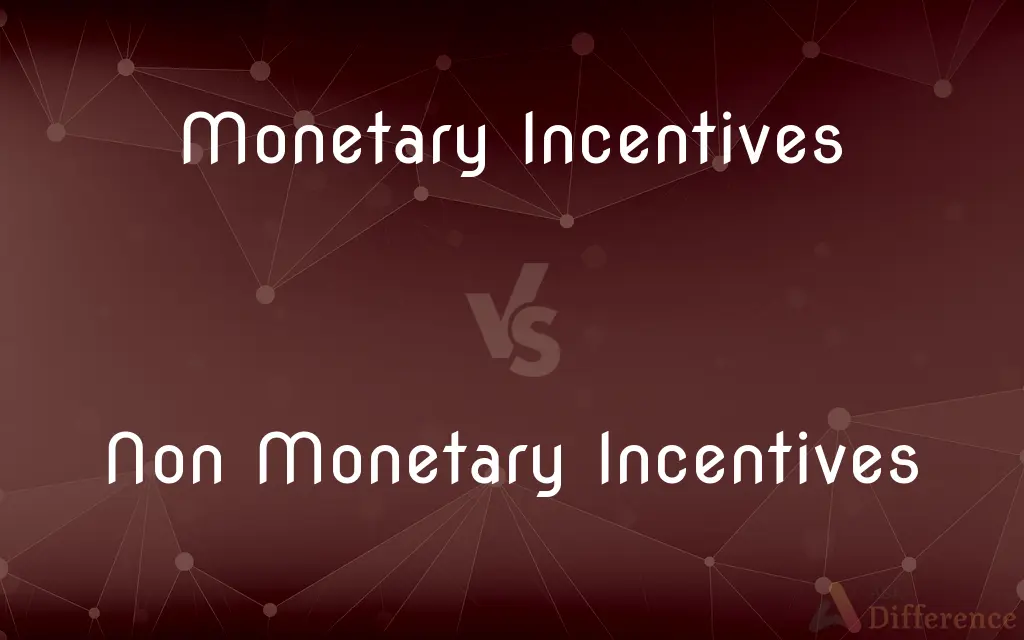Monetary Incentives vs. Non Monetary Incentives — What's the Difference?
By Tayyaba Rehman — Published on October 16, 2023
Monetary Incentives are financial rewards like bonuses; Non Monetary Incentives are non-financial rewards like flexible work hours.

Difference Between Monetary Incentives and Non Monetary Incentives
Table of Contents
ADVERTISEMENT
Key Differences
Monetary Incentives and Non Monetary Incentives are motivators used to enhance productivity and job satisfaction but are different in nature. Monetary Incentives are financial rewards given to employees based on their performance, such as bonuses, raises, or profit-sharing. They are tangible and quantifiable and aim to satisfy the financial needs of employees. In contrast, Non Monetary Incentives are rewards that do not involve a direct financial payment, such as recognition, promotions, or flexible work hours, intended to satisfy employees’ psychological needs and improve job satisfaction and organizational commitment.
Monetary Incentives can be powerful motivators as they directly impact an individual’s financial stability and lifestyle, fulfilling basic needs and facilitating the attainment of personal goals. They are particularly effective in roles where performance is easily measured and are often used to drive short-term productivity and incentivize specific outcomes. However, Non Monetary Incentives play a crucial role in addressing employees’ intrinsic motivations and emotional needs, fostering a positive work environment, encouraging long-term loyalty and engagement, and enhancing overall well-being.
In the workforce, Monetary Incentives are usually straightforward and can be effective across different sectors and job roles, offering immediate gratification and acting as a clear indicator of performance acknowledgment. However, Non Monetary Incentives, being more diverse and subjective, can offer more personalized and meaningful rewards, addressing individual preferences and values, and can have a lasting impact on job satisfaction and employee morale, contributing to a supportive and inclusive workplace culture.
While both Monetary and Non Monetary Incentives are integral for employee motivation and satisfaction, striking the right balance between them is crucial. Relying solely on Monetary Incentives may not sustain motivation in the long run as employees also seek appreciation, growth, and a positive work environment, provided by Non Monetary Incentives. Conversely, only offering Non Monetary Incentives might not address the practical and financial needs of the employees.
In essence, the strategic use of Monetary and Non Monetary Incentives can drive organizational success by addressing both the tangible and intangible needs of employees, promoting a balanced and holistic approach to employee motivation and satisfaction, thereby fostering a motivated and committed workforce.
ADVERTISEMENT
Comparison Chart
Nature
Financial, tangible
Non-financial, intangible
Impact
Immediate gratification, financial stability
Long-term satisfaction, emotional fulfillment
Examples
Bonuses, raises, profit-sharing
Recognition, flexible hours, promotions
Application
Short-term productivity, specific outcomes
Long-term loyalty, overall well-being
Focus
Financial needs, personal goals
Psychological needs, intrinsic motivations
Compare with Definitions
Monetary Incentives
Monetary Incentives offer immediate gratification and address practical and financial needs.
Monetary incentives like bonuses help in alleviating financial stress for employees.
Non Monetary Incentives
Non Monetary Incentives are diverse and can be personalized to individual preferences and values.
Personalized non monetary incentives are highly effective in addressing individual needs and preferences.
Monetary Incentives
Monetary Incentives are quantifiable and often used to drive short-term productivity.
The company uses monetary incentives to boost quarterly sales.
Non Monetary Incentives
Non Monetary Incentives can have a lasting impact on employee loyalty and engagement.
Career advancement opportunities, a form of non monetary incentives, encourage employee commitment.
Monetary Incentives
Monetary Incentives are tangible financial rewards intended to motivate employees.
The sales team was motivated by the promise of monetary incentives for reaching their targets.
Non Monetary Incentives
Non Monetary Incentives are intangible rewards intended to enhance job satisfaction.
Non monetary incentives like recognition can significantly improve employee morale.
Monetary Incentives
Monetary Incentives are often linked to performance and specific outcomes.
The organization awarded monetary incentives to high-performing employees annually.
Non Monetary Incentives
Non Monetary Incentives address intrinsic motivations and emotional needs.
Offering non monetary incentives like flexible hours caters to employees' work-life balance.
Monetary Incentives
Monetary Incentives are straightforward and effective across different sectors and job roles.
The implementation of monetary incentives has been universally recognized as a motivator.
Non Monetary Incentives
Non Monetary Incentives contribute to a supportive and inclusive workplace culture.
Non monetary incentives such as a positive work environment retain employees in the long run.
Common Curiosities
What do Non Monetary Incentives entail?
Non Monetary Incentives include intangible rewards like recognition or flexible work hours, aimed at improving job satisfaction.
Are Monetary Incentives effective motivators?
Yes, Monetary Incentives are effective, offering immediate gratification and addressing financial needs, especially for short-term goals.
Are Monetary Incentives always financial?
Yes, Monetary Incentives are always financial and tangible, directly impacting an individual’s financial stability.
Are Non Monetary Incentives personalized?
Non Monetary Incentives can be more personalized and meaningful, catering to individual preferences and values.
How do Non Monetary Incentives impact workplace culture?
Non Monetary Incentives foster a positive and inclusive workplace culture by addressing psychological needs and promoting overall well-being.
What are Monetary Incentives?
Monetary Incentives are financial rewards like bonuses or raises, given to enhance productivity and job satisfaction.
Can Non Monetary Incentives improve job satisfaction?
Absolutely, Non Monetary Incentives address intrinsic motivations and emotional needs, contributing to long-term job satisfaction and loyalty.
Can Non Monetary Incentives lead to employee retention?
Yes, Non Monetary Incentives like a positive work environment and growth opportunities can lead to enhanced employee retention.
Should Monetary Incentives be performance-based?
While not mandatory, Monetary Incentives are often performance-based to drive specific outcomes and enhance productivity.
Can Monetary Incentives drive productivity?
Definitely, Monetary Incentives are often linked to performance and can incentivize specific outcomes, driving productivity.
Is offering Monetary Incentives a universal practice?
Offering Monetary Incentives is a widely recognized practice across different sectors and job roles for its effectiveness in motivation.
Do Non Monetary Incentives contribute to emotional fulfillment?
Absolutely, Non Monetary Incentives address emotional needs and intrinsic motivations, contributing to emotional fulfillment.
Can Monetary Incentives impact personal goals?
Yes, Monetary Incentives can facilitate the attainment of personal goals by addressing financial needs and offering financial stability.
Share Your Discovery

Previous Comparison
Might vs. Will
Next Comparison
Republic vs. CountryAuthor Spotlight
Written by
Tayyaba RehmanTayyaba Rehman is a distinguished writer, currently serving as a primary contributor to askdifference.com. As a researcher in semantics and etymology, Tayyaba's passion for the complexity of languages and their distinctions has found a perfect home on the platform. Tayyaba delves into the intricacies of language, distinguishing between commonly confused words and phrases, thereby providing clarity for readers worldwide.
















































